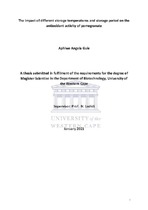| dc.contributor.advisor | Ludidi, Ndomelele | |
| dc.contributor.author | Gule, Aphiwe Angela | |
| dc.date.accessioned | 2022-01-19T09:09:19Z | |
| dc.date.issued | 2021 | |
| dc.identifier.uri | http://hdl.handle.net/11394/8614 | |
| dc.description | >Magister Scientiae - MSc | en_US |
| dc.description.abstract | Fruit storage at cold temperatures is normally used to delay decay while maintaining the fruit’s quality. However, storage at low temperatures for a prolonged period causes some important metabolic functions within the fruit to stop functioning properly. This phenomenon is even more critical and complex in chilling-sensitive fruits. Fruits that originated in the tropical and sub-tropical regions are known to be chilling sensitive; their storage at low but non-freezing temperatures causes them to experience chilling injury (CI). Chilling injury causes irreversible damage to the external and internal attributes of the fruits. Pomegranate, which is investigated in this study, is consumed as fresh arils in many regions of the world. | en_US |
| dc.language.iso | en | en_US |
| dc.publisher | University of Western Cape | en_US |
| dc.subject | Pomegranate | en_US |
| dc.subject | Oxidative stress | en_US |
| dc.subject | Antioxidant activity | en_US |
| dc.subject | Chilling injury | en_US |
| dc.subject | Storage temperatures | en_US |
| dc.title | The impact of different storage temperatures and storage period on the antioxidant activity of pomegranate | en_US |
| dc.rights.holder | University of Western Cape | en_US |
| dc.description.embargo | 2023 | |

